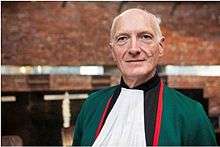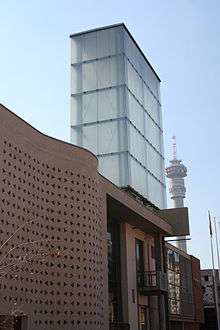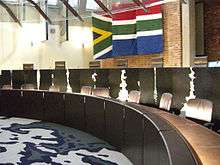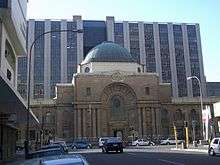Constitutional Court of South Africa
| Constitutional Court
List
| |
|---|---|
|
Constitutional Court building | |
| Established | 1994 |
| Country | South Africa |
| Location | Constitution Hill, Johannesburg |
| Coordinates | 26°11′19″S 28°2′36″E / 26.18861°S 28.04333°ECoordinates: 26°11′19″S 28°2′36″E / 26.18861°S 28.04333°E |
| Composition method | Presidential appointment, after consultation |
| Authorized by | Constitution of South Africa |
| Judge term length | non-renewable 12 years (extendable by Parliament) |
| Number of positions | 11 |
| Website | www.constitutionalcourt.org.za |
| Chief Justice of South Africa | |
| Currently | Mogoeng Mogoeng |
| Since | 8 September 2011 |
| Acting Deputy Chief Justice of South Africa | |
| Currently | Bess Nkabinde |
| Since | 23 May 2016 |
The Constitutional Court of South Africa is a supreme constitutional court established by the Constitution of South Africa. It was originally the final appellate court for constitutional matters. Since the enactment of the Superior Courts Act in 2013, the Constitutional Court has jurisdiction to hear any matter if it is in the interests of justice for it to do so.
The court was first established by the Interim Constitution of 1993, and its first session began in February 1995.[1] It has continued in existence under the Constitution of 1996. The court sits in the city of Johannesburg. It also has occupied a purpose-built complex on Constitution Hill. The first court session in the new building at this location was held in February 2004.
The Constitutional Court consists of eleven judges who are appointed by the President of South Africa from a list drawn up by the Judicial Service Commission. The judges serve for a term of twelve years. The court is headed by the Chief Justice of South Africa and the Deputy Chief Justice. The Constitution requires that a matter before the Court be heard by at least eight judges. In practice, all eleven judges hear almost every case. Decisions are reached by a majority and written reasons are given.
History
The movement for the establishment of the Constitutional Court in South Africa started in 1920 by African National Congress(ANC).[2]

By the year 1956, judges and liberals in the country put up bill of rights as a support for the creation of the court. The first meeting of selected members of the court took place in 1994. In 1995, President Nelson Mandela was at the court to deliver a speech for its commissioning . According to South African History Online Mandela says “The last time I appeared in court was to hear whether or not I was going to be sentenced to death. Fortunately for myself and my colleagues we were not. Today I rise not as an accused, but on behalf of the people of South Africa, to inaugurate a court South Africa has never had, a court on which hinges the future of our democracy." [2]
The Constitutional Court building
Constitution Hill is the seat of the Constitutional Court of South Africa. The Constitution Hill precinct is located at 11 Kotze Street in Braamfontein, Johannesburg near the western end of the suburb of Hillbrow. The hill overlooks downtown Johannesburg to the South and the wealthy northern suburbs of Houghton, Parktown, Sandton, etc. to the North.
The court building itself was built using bricks from the demolished awaiting-trial wing of the former prison. Most of the prison has been demolished to make way for the new court, but the stairwells have been kept and incorporated into the new building as a reminder of how South Africa has overcome the dark days of oppression. Inside the main room, a row of horizontal windows has been set up behind the seats of the judges. While the windows are at the head-height of judges on the inside, they are on ground level on the outside. Those sitting in the court have a view of the feet of passersby moving along, above the heads of the judges, to remind that in a constitutional democracy the role of the judges is to act in the interest of the people of the nation, rather than in self interest.[3] The first court session in the new building at this location was held in February 2004. The court building is open to the public who want to attend hearings or view the art gallery in the court atrium. The court houses a collection of more than 200 contemporary artworks chosen by Constitutional Court judge Albie Sachs, including works by Gerard Sekoto, William Kentridge, and Cecil Skotnes.
The entrance to the court written in all 11 official languages of South Africa. The doors to the court have the 27 rights of the Bill of Rights carved into them. One of the stairwells from the old trial awaiting blocks with the Portuguese words A luta continua written in lights on it meaning the struggle continues
Justices
Appointment procedure and tenure
Sections 174 to 178 of the Constitution deal with the appointment of judicial officers.[4] Judges may not be members of Parliament, of the government or of political parties. To select judges the Judicial Service Commission first draws up a list of candidates which list must have at least three more names than the number of vacancies. The Commission does this after calling for nominations and holding public interviews. Then the President, after consultation with the Chief Justice and the leaders of political parties represented in the National Assembly, chooses the judges from this selection.
In terms section 176(1) of the Constitution, judges of the Constitutional Court serve for a non-renewable term of 12 years or until they reach the age of 70, whichever is earlier; but these limits may be extended by an Act of Parliament. Section 4 of the Judges Remuneration and Conditions of Employment Act 47 of 2001 has extended the term limit to an effective term of 15 years including prior service on other courts: the effect is that judges who had served more than 3 years before their appointment to the Constitutional Court retain a 12-year term limit; those who did not have a longer tenure. The same section extends the retirement age to 75. However, in terms of section 3(2)(b), if the judge has already been a judge (in any court) for 15 years by the time she reaches the age of 65, she may voluntarily retire.
Current justices
| Name | Born | Appt. by | Age at appt. | First day / Length of service |
Mand. retirement | Opt. retirement | Previous positions | Succeeded |
|---|---|---|---|---|---|---|---|---|
|
Mogoeng, MogoengMogoeng Mogoeng |
14 January 1961 (age 55) in Zeerust, North West |
Zuma, JacobJacob Zuma | 50 | 1 November 2009 7 years, 1 month |
1 November 2021 | N/A | North West High Court | Sandile Ngcobo |

Cameron, EdwinEdwin Cameron |
15 February 1953 (age 63) in Pretoria, Gauteng |
Motlanthe, KgalemaKgalema Motlanthe | 55 | 1 January 2009 7 years, 11 months |
1 January 2021 | 15 February 2018 | South Gauteng High Court Supreme Court of Appeal |
Tholie Madala |
| Froneman, JohanJohan Froneman | 10 February 1954 (age 62) in East London, Eastern Cape |
Zuma, JacobJacob Zuma | 55 | 1 November 2009 7 years, 1 month |
1 November 2021 | 10 February 2019 | Eastern Cape High Court | Kate O'Regan |
|
Jafta, ChrisChris Jafta |
1 January 1959 (age 57) in Matatiele, Eastern Cape |
Zuma, JacobJacob Zuma | 50 | 1 November 2009 7 years, 1 month |
1 November 2021 | N/A | Eastern Cape High Court Supreme Court of Appeal |
Albie Sachs |
|
Khampepe, SisiSisi Khampepe |
8 January 1957 (age 59) in Soweto, Gauteng |
Zuma, JacobJacob Zuma | 52 | 1 November 2009 7 years, 1 month |
1 November 2021 | N/A | North Gauteng High Court | Yvonne Mokgoro |
|
Madlanga, MbuyiseliMbuyiseli Madlanga |
27 March 1962 (age 54) in Mount Frere, Eastern Cape |
Zuma, JacobJacob Zuma | 51 | 1 August 2013 3 years, 4 months |
1 August 2025 | N/A | Eastern Cape High Court | Zak Yacoob |
|
Mhlantla, NonkosiNonkosi Mhlantla |
2 May 1964 (age 52) in Port Elizabeth, Eastern Cape |
Zuma, JacobJacob Zuma | 51 | 1 December 2015 1 year |
1 December 2027 | N/A | Eastern Cape High Court Supreme Court of Appeal |
Thembile Skweyiya |
|
Nkabinde, BessBess Nkabinde |
1 January 1959 (age 57) in Silwerkrans, North West |
Mbeki, ThaboThabo Mbeki | 47 | 1 January 2006 10 years, 11 months |
1 January 2018 | N/A | North West High Court | Arthur Chaskalson |
|
Zondo, RaymondRaymond Zondo |
4 May 1960 (age 56) in Ixopo, KwaZulu-Natal |
Zuma, JacobJacob Zuma | 47 | 1 September 2012 4 years, 3 months |
1 September 2024 | N/A | Labour Court
North Gauteng High Court |
Pius Langa |
Following the retirement of Justice Johann van der Westhuizen in January 2016, there has been one vacancy on the Court which the Judicial Service Commission has struggled to fill due to the small number of applicants.[5][6]
Former Chief Justices
- Chief Justice Arthur Chaskalson (born 1931, appointed by Nelson Mandela as President of the Constitutional Court in 1994, became the Chief Justice in 2001, retired in 2005, died in 2012)
- Chief Justice Pius Langa (born 1939, appointed by Nelson Mandela in 1994, elevated to Deputy President of the Court by Nelson Mandela in 1997, became Deputy Chief Justice in 2001, elevated to Chief Justice by Thabo Mbeki in 2005, retired in 2009, died in 2013)
- Chief Justice Sandile Ngcobo (born 1953, appointed by Nelson Mandela in 1999 and elevated by Jacob Zuma in 2009, retired in 2011)
Former Deputy Chief Justices
- Deputy Chief Justice Pius Langa, appointed in 2001, elevated to Chief Justice in 2005,retired in 2009, died in 2013.
- Deputy Chief Justice Dikgang Moseneke, appointed to the Constitutional Court in 2002, elevated to Deputy Chief Justice in 2005, retired in 2016.
Former justices

- Justice John Didcott (born 1931, appointed by Nelson Mandela in 1995, died in office in 1998)
- Justice Ismail Mahomed (born 1934, appointed by Nelson Mandela in 1995, elevated to Chief Justice of the Supreme Court of Appeal in 1998, died in 2000)
- Justice Richard Goldstone (born 1938, appointed by Nelson Mandela in 1994, retired in 2003)
- Justice Johann Kriegler (born 1932, appointed by Nelson Mandela in 1994, retired in 2003)
- Justice Lourens Ackermann (born 1934, appointed by Nelson Mandela in 1994, retired in 2004)
- Justice Tholie Madala (born 1937, appointed by Nelson Mandela in 1994, retired in 2008, died in 2010)
- Justice Yvonne Mokgoro (born 1950, appointed by Nelson Mandela in 1994, retired in 2009)
- Justice Kate O'Regan (born 1957, appointed by Nelson Mandela in 1994, retired in 2009)
- Justice Albie Sachs (born 1935, appointed by Nelson Mandela in 1994, retired in 2009)
- Justice Zak Yacoob (born 1948, appointed by Nelson Mandela in 1998, retired in 2013)
- Justice Thembile Skweyiya (appointed by Thabo Mbeki in 2003, retired in 2014, died in 2015)
- Justice Johann van der Westhuizen (appointed by Thabo Mbeki in 2004, retired in 2016)
The Constitution as the supreme law
The judgments of the court are based on the constitution, which is the supreme law of the land. They guarantee the basic rights and freedoms of all persons. They are binding on all organs of government, including the parliament, the presidency, the police force, the army, the public service and all courts. This means that the court has the power to declare an Act of Parliament null and void if it conflicts with the constitution and to control executive action in the same way.
When interpreting the Constitution, the court is required to consider international human rights law and may consider the law of other democratic countries.[7] Since the enactment of the Superior Courts Act, the Constitutional Court has jurisdiction to hear any matter if it is in the interests of justice for it to do so.
Other bodies protecting human rights
The court is one of many bodies created by the constitution to defend the rights of citizens. It is concerned basically with matters of broad constitutional principle. Bad or incorrect conduct by state officials can be reported to the Office of the Public Protector, formerly called the Ombudsman. A Human Rights Commission has been established to handle complaints of violation of human rights in daily life. The ordinary courts, notably the small claims courts, the Magistrates' Courts, the High Courts and the Supreme Court of Appeal, deal with day-to-day disputes between citizens and the state.
Co-operation with Parliament and Provincial Assemblies
The Constitutional Court has a special responsibility to parliament and provincial legislatures. If there is a dispute in parliament or in a provincial legislature concerning whether or not legislation that has been passed and assented to is constitutional, a third of the members of the body concerned may apply to the Constitutional Court to give a ruling. Similarly, the President or the Premier of a Province may refer a bill to the court for a decision on its constitutionality before assenting to that Bill.
Proceedings in court
The court does not hear evidence or question witnesses. It does not decide directly whether accused persons are guilty or whether damages should be awarded to an injured person. These are matters for the ordinary courts. Its function is to determine the meaning of the Constitution in relation to matters in dispute. One consequence of this is that the court works largely with written arguments presented to it by the parties. The hearings of the court are intended to address particularly difficult issues raised by the written arguments of the parties.
The hearings of the court are open to the public and the press. No cameras or recorders are ordinarily permitted. The public is invited to attend all sessions. Ordinary rules of decent dress and decorum apply.
Notable judgments
- S v Makwanyane and Another (6 June 1995): abolished the death penalty, declaring capital punishment to be inconsistent with the Interim Constitution.
- Government of the Republic of South Africa v Grootboom (4 October 2000): the government is obliged to provide housing relief to those living in intolerable situations or in crisis situations.
- Mohamed v President of the Republic of South Africa (28 May 2001): suspects cannot be extradited under circumstances where they may face the death penalty.
- Alexkor v Richtersveld Community (14 October 2003): rights to land under customary law must be recognised, and communities dispossessed of land owned under customary law are entitled to restitution.
- Minister of Home Affairs and Another v Fourie and Another (1 December 2005): the government must recognize and allow same-sex marriage.
- Economic Freedom Fighters v Speaker of the National Assembly and Others; Democratic Alliance v Speaker of the National Assembly and Others (31 March 2016): recommendations of the Public Protector are binding.
Hlophe controversy
On 30 May 2008 the judges of the Constitutional Court issued a statement reporting that they had referred Cape Judge President Judge John Hlophe to the Judicial Service Commission as a result of what they described in their statement as an approach to certain of them "in an improper attempt to influence this Court's pending judgement in one or more cases".[8] The statement stated further that the complaint related to four matters in which either Thint (Pty) Ltd or the Deputy President, Jacob Zuma, were involved. Judge Hlophe was reported to have rejected the allegations as "utter rubbish" and as "another ploy" to damage his reputation.
Though Justices Chris Jafta and Bess Nkabinde had been the primary complainants and had supported the Court's complaint. Yet, six years later, when the misconduct enquiry against Hlophe was pending, Jafta and Nkabinde brought a court challenge to the tribunal's jurisdiction, saying their own complaint was not legally valid.[9] Commentators slammed Jafta and Nkabinde's "cowardice", which had brought the Constitutional Court into disrepute.[10] The judges claimed, in response, that they were simply upholding the Constitution.[11] The High Court dismissed the judges' application on 26 September 2014,[12] but they appealed.[13] The Supreme Court of Appeal dismissed that appeal in March 2016, criticising Jafta and Nkabinde's damaging court application and implying that the case raised questions about their "integrity".[14] On 6 April 2016, Jafta and Nkabinde filed an appeal to the Constitutional Court – their own court – asking it to overturn the Supreme Court of Appeal's judgment.[15] They did so partly on the basis that the SCA made "hurtful" imputations about them. The Constitutional Court has already held, in 2012, that it cannot hear appeals in the Hlophe matter and that any SCA judgment is final.[16]
See also
- Constitutionalism
- Jurisprudence
- Judicial Service Commission (South Africa)
- Constitution Hill, Johannesburg
| Wikimedia Commons has media related to Constitutional Court of South Africa. |
References
- ↑ http://www.constitutionalcourt.org.za/text/judges/current/justicebessnkabinde/1.html
- 1 2 South Africa History Online. "Historical Background of the Constitutional Court". Retrieved 3 June 2016.
- ↑ https://www.citysightseeing.co.za/johannesburg/stops/entry/constitution-hill
- ↑ Constitutional Court of South Africa's official website
- ↑ Rabkin, Franny. "Call goes out for Constitutional Court judge". Business Day Live. Retrieved 2016-04-09.
- ↑ Rabkin, Franny. "LAW MATTERS: Lack of enthusiasm for Constitutional Court a worry". Business Day Live. Retrieved 2016-04-09.
- ↑ Erskine, Daniel H (December 2008). "Judgments of the United States Supreme Court and the South African Constitutional Court as a Basis for a Universal Method to Resolve Conflicts Between Fundamental Rights". Journal of Civil Rights and Economic Development. 3 (22): 595. Retrieved 30 April 2016.
- ↑ Smook, Ella (13 October 2008). "Judge Jafta pulls ConCourt application". IOL.
- ↑ SAPA (21 October 2013). "Judges file Hlophe review application". IOL.
- ↑ Mackaiser, Eusebius (7 October 2013). "Shame on those two Concourt judges". IOL.
- ↑ Hawker, Dianne (21 October 2013). "Nkabinde and Jafta: We are fighting for the Constitution". eNCA.
- ↑ Nkabinde and Another v Judicial Service Commission and Others [2014] ZAGPJHC 217; 2015 (1) SA 279 (GJ).
- ↑ Tolsi, Niren (6 October 2014). "Hlophe 'misconduct': Jafta, Nkabinde stall matter". News24. City Press.
- ↑ "Nkabinde and Another v Judicial Service Commission and Others (20857/2014) [2016] ZASCA 12". SAFLII. 10 March 2016.
- ↑ Affairs, SABC News and Current. "HLOPHE CONCOURT". iono.fm. Retrieved 2016-04-07.
- ↑ "Hlophe v Premier of the Western Cape Province". SAFLII. 30 March 2012.


